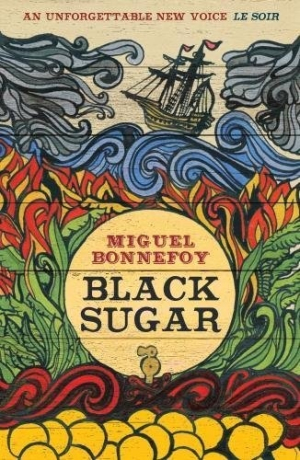Black Sugar
Black Sugar opens as pirate Henry Morgan dies clutching his gold, his ship sinking under a Caribbean forest. In this moment of vivid magical realism, Miguel Bonnefoy sets the stakes for his novel—sunken treasure in the islands and the lengths people will go to find and keep it.
The story leaps, from Morgan, some three hundred years into the future, to the small self-sustaining village that now lies atop the ruined ship. On the Oteros sugar cane farm, an old woman enters the house and proceeds to a locked back room to which only she has the key. She brings with her a bucket to fill with tears, adding another layer of mystery to the story’s fantastical start.
Other characters converge at the Oteros sugar cane farm, some searching for love, some for the lost treasure. In this allegory, love of the land battles with desire for the control of wealth. The character who grounds it all is amateur botanist Serena Oteros, an introverted only child and heir to the farm.
The landscape of the novel is lush and vibrant. It both takes and gives at its whim, and the descriptions of it capture its greenery and humidity. From sugar cane to rum, Bonnefoy honors and details the farming and production processes with richly detailed prose. He is similarly adept at conveying the vagaries of relationships between lovers and between parents and children, and grants access to the inner thoughts of multiple characters to capture such tensions.
The novel sails through three generations of love and intrigue, adeptly switching between inner thoughts and opulent exteriors. When it reaches its denouement, its many threads weave together in a way that is unexpected and entirely satisfying.
Black Sugar holds its own in the Latin American magical-realism tradition.
Reviewed by
Camille-Yvette Welsch
Disclosure: This article is not an endorsement, but a review. The publisher of this book provided free copies of the book to have their book reviewed by a professional reviewer. No fee was paid by the publisher for this review. Foreword Reviews only recommends books that we love. Foreword Magazine, Inc. is disclosing this in accordance with the Federal Trade Commission’s 16 CFR, Part 255.

